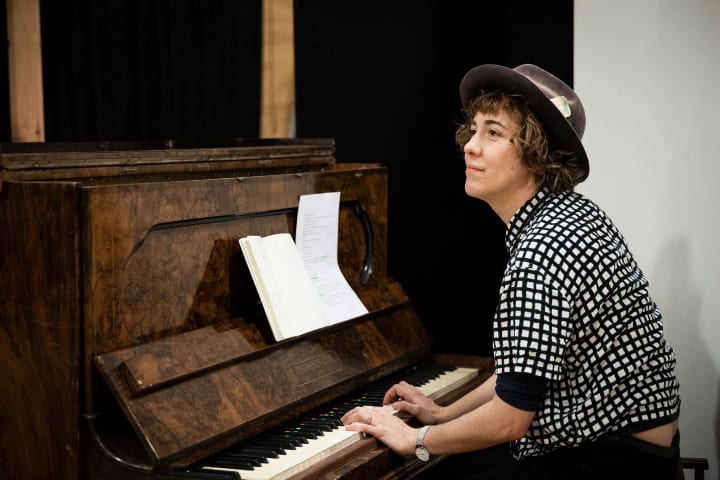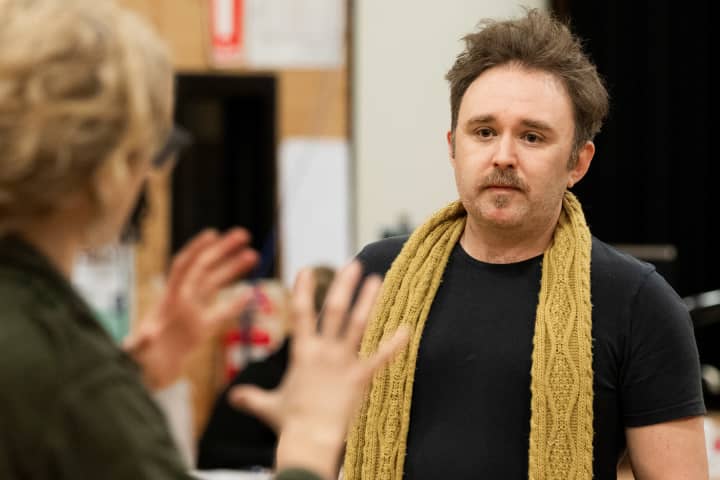As Roxanne in Melbourne Theatre Company’s new adaptation of Cyrano, Tuuli Narkle is playing a role more familiar to her own life than any she’s taken on before. ‘Virginia wrote it so Roxanne is a woman of colour … who is queer. How many times in your life does a character align so clearly with who you are as a person and as an artist?’

Virginia Gay and Tuuli Narkle rehearsing Cyrano. Photo: Charlie Kinross
How did you get your start in acting?
I grew up in a low socio-economic household, and there were programs that ran in my area, in Fremantle, that were geared towards keeping kids from being naughty. They would pick us up on a bus every weekend and we’d go and learn circus and different kinds of performance and dance. So that was the beginning. Then one day I decided I wanted to be in my primary school’s performance assembly. I think I was in year three. So I got up and I auditioned: my heart was pounding and I was terrified but the thrill just electrified me. I got the role, and that was my first big step into it.
‘I saw Leah Purcell do an interview. I had just started high school at this point and watching her speak was a pivotal moment for me because I saw myself as an Aboriginal woman reflected back to me.’
Because of that, my mum saw that I had an inclination towards performing so she enrolled me in after-school dance. So I initially went into the movement side of performing – until I saw Leah Purcell do an interview. I had just started high school at this point and watching her speak was a pivotal moment for me because I saw myself as an Aboriginal woman reflected back to me. I hadn’t previously had that level of representation on the television, of all things. It made me realise that this is a feasible thing that I wanted to do; that I can do. It is absolutely a viable option. After that, I was just guns blazing, let’s do it!
Were there any other particular inspirations on your career?
That moment [mentioned above], and Deborah Mailman in The Secret Life of Us. She’s so effervescent as a human being. And also The Sapphires and watching Miranda Tapsell and Shari Sebbens in their roles. I had heard about them because they were NIDA graduates, and I wanted to get into NIDA.
And you ended up working with Tapsell in Black is the New White?
Yes. It was terrifying at first but she’s just this beautiful warm little angel and it was the best experience.
After working with Miranda Tapsell you then went on to play Evonne Goolagong in Andrea James’s Sunshine Super Girl. How was that experience?
It was an actual whirlwind! We had just got out of the 130 days we spent in lockdown in Melbourne and WA was finally letting us in, so my partner and I went to WA and I thought ‘finally we’re free, we get to relax.’ And then I got a call from Andrea James, who said ‘the star of our show, Katie Beckett, has fractured her elbow. We have about two weeks until we’re going to put this up in Sydney. Is it something you’re interested in?’
‘This play really ignited something in me and I was like ‘I have to do this role. I just have to, in any capacity.’
I was torn because I’d just got home; it was the first time my partner was meeting my family, and I hadn’t seen them in a year. And two weeks is not that long to prepare for a role. I pitched James a Zoom rehearsal for the first week, so I could hang out in WA for at least a bit. After a week, I flew to Sydney for the remainder of rehearsal but then Sydney went through their December COVID wave, meaning I ended up having only six days of rehearsals until we opened, for a lead role! She doesn’t leave the stage once, in over two hours. So it was an utter whirlwind.
Also, because I was born in the mid-90s I didn’t know quite the cultural significance of Evonne Goolagong in the tapestry of Australian icons. So the response to that show was really mind blowing, and I wasn’t prepared for it. But it was such a magical experience; the show is a beautiful representation of her tenacity and her charisma and the amazing things that she did, coming from where she came from.
What did you learn from going through such an intense experience?
I think the love in that particular room made me really mindful of the kind of actor that I want to be, which is somebody who holds space for the other person. In that rehearsal room, I felt really held by the ensemble; I wouldn’t have been able to do it without them. So the biggest takeaway for me is that I absolutely want to hold space for myself but I also want to hold space for my fellow artists at all times.
You’re still quite early in your career: what does success look like to you in the years ahead?
I don’t have a burning desire for success, necessarily; it’s just that I don’t want to have another job. I just want to be consistently in the room. That’s success to me. This is the stuff that makes me want to get up in the morning.
What is something about you that most people wouldn’t necessarily know?
I come from a long line of Finnish reindeer herders.

Tuuli Narkle rehearsing Cyrano. Photo: Charlie Kinross
What were your thoughts when you first read Virginia Gay’s Cyrano script?
I first got the script just as the lockdown was lifting last year, and reading it resulted in this lightbulb moment that felt like a love letter to life! There’s a line that Roxanne says – ‘I’m hungry for knowledge, complicated and contradictory’ – and that was a poignant moment for me because I really resonated with that feeling: everybody was hungry to go back to normal but we were all like ‘hang on what is normal? Is it even something that we do collectively want to go back to?’ So this play really ignited something in me and I was like ‘I have to do this role. I just have to, in any capacity.’
That seems a common reaction with this show…
Absolutely. I just I don’t think I’ve been more excited about something in a long time!
Can you elaborate on what excites you about playing Roxanne?
I think it’s her appetite, her hunger for life. In the original, and this one, she is highly intelligent but it never feels like an intelligence that keeps anyone out. It is just this delight in life, in the way that it is disgusting and it’s hurtful and it’s complicated and it’s messy, and there is such beauty in the shit bits of it as much as there is in the inherently beautiful parts.
And she also has the love interest with Cyrano and that is a queer love interest. Virginia wrote it so that Roxanne is a woman of colour, so there are these beautiful little nuggets of a really multifaceted human being that I really latched on, being someone who is mixed race, who is queer. I mean, how many times in your life does a character align so clearly with who you are as a person and as an artist?! I thought ‘surely there’s no one else; surely it was written for me.’
Happily, Sarah Goodes [the play’s director] was very clear that in these roles we are bringing so much of ourselves to it. They are characters but we are bringing all of our lived experience to these characters, so I almost don’t see Roxanne separate from myself. It’s one of the first characters where I feel like we are one and the same, or two facets of the same person.
What creative challenges does the role present you as an actor?
In my career so far, outside of drama school, I have mostly come into roles that have already been created. And now I’m tentatively dipping my toe back into creating a role from the ground up and really taking ownership of the entire story of this character, which in my career so far I haven’t actually had the opportunity to do that much. And Sarah and Virginia are so open to everything that you bring, which is so freeing and so utterly terrifying! The possibilities are endless. So it’s amazing but also quite challenging. It’s a bit of a freefall but there’s magic in that, for sure.
Cyrano is on stage from 24 September at Southbank Theatre.
This article was originally published on 19 July 2021.
Published on 19 July 2021





